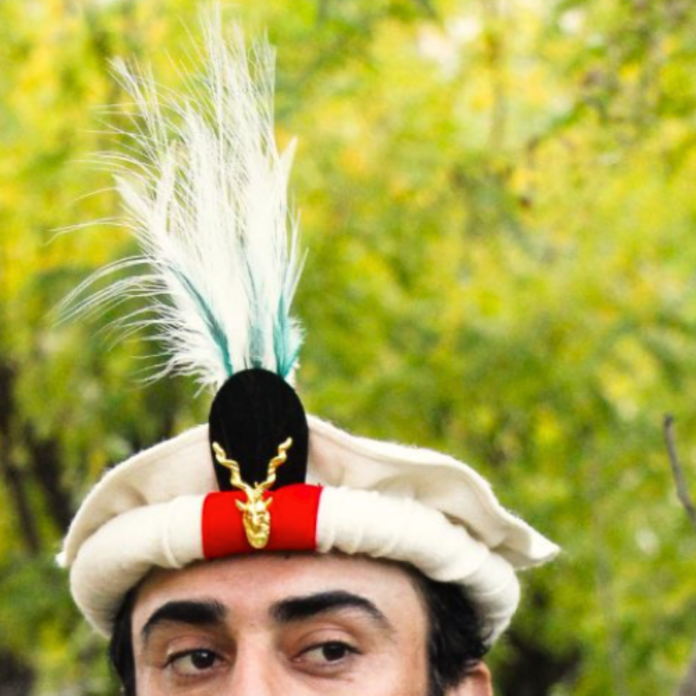- Advertisement -
PESHAWAR, Oct 28 (APP):As the temperature significantly dropped in Khyber Pakhtunkhwa (KP), signaling the dawn of a winter season, Sher Ali, a renowned Chitrali woolen cap maker, finds himself busier than ever by earning maximum capital in the lucrative market of Peshawar.
Unaware of the Chappli Kabab being cold on his side table in the two-room shop, Sher was seen asking his three laborers to hurry up to complete the placed orders before harsh weather.
His shop in Jahingarpura near Qissa Khwani bazaar, established in 2010, has become a go-to destination for those seeking warmth and style in the form of these traditional quality woolen caps being liked in all provinces, Azad Kashmir, and overseas due to their durability.
Sher Ali, known affectionately as ‘Chitrali Chacha’, by locals, inherited this craft from his father, who passed away unexpectedly due to a cardiac arrest.
After moving to Peshawar in 2015 in search of better economic opportunities, Sher Ali transformed his inherited skills into a thriving business.
“I have been making Chitrali hats for 14 long years,” he explained, while urging his laborers to work faster to meet the growing demand.
The intricate process of creating a single cap takes about five hours of careful craftsmanship. The Chitrali cap, made from pure wool, is not just a local favorite; its quality and affordability have garnered attention from buyers in Punjab and even neighboring Afghanistan.
He said the prices for these handmade hats range from Rs 1,000 to Rs 3,000, depending on the design, wool weight, and standard.
The popularity of the Chitrali wollen cap has also attracted foreign tourists, especially from Europe and Central Asian Republics, who are eager to purchase these unique pieces from the historic bazaar.
In the past, high-profile visitors, including UK royals like Princess Diana and Prince William, have received these caps during their visit to Chitral as gifts, further elevating the product status.
Established in the 1940s, the Qissa Khwani bazaar has grown from a few shops to around 800, primarily run by Chitrali craftsmen, where these days the atmosphere is electric, filled with shoppers eager to embrace the winter season in style.
Haji Ehsan Sarwar, a Dubai-based Pakistani businessman, shared his enthusiasm as he browsed the stalls. “I came to purchase five such caps for my family in Dubai. Their durability and warmth impress me the most,” he said.
Khayam Chitrali, President of the Chitral Business Community in Peshawar, reflected on the bazaar’s evolution since he first opened his shop in 1982.
“The enduring appeal of the Chitrali cap, which continues to be a cultural emblem and a practical solution to the region’s cold winters,” he noted.
Khayam said, “The coronavirus pandemic has barely impacted their business and demanded special financial loans to the affected craftsmen.”
According to the Pakistan Bureau of Statistics (PBS), Pakistan’s textile group exports have increased by around 0.93 percent during the fiscal year 2023-24 and remained at $16.655 billion as compared to $16.501 billion in 2022-23.
The country’s exports in the fiscal year 2023-2024 totaled $30.677 billion (provisional) against $27.724 billion during the corresponding period of last year, showing an increase of 10.65 percent.
Similarly, textile group exports, including woolen garments, remained at $1.414 billion when compared to $1.471 billion during the same month of last year.
Similarly, the main commodities of exports during June 2024 were knitwear (Rs119,053 million), readymade garments (Rs90,445 million), and bed wear (Rs65,290 million).
Dr Zilakat Malik, former Chairman Economics Department at the University of Peshawar, said, “Pakistan Bureau of Statistics data revealed the steady growth of textiles, including woolen garments, which is positive signs.”
He said there was great economic scope in woolen trade, especially in Central Asian States and European countries, and suggested that Pakistan could attract huge revenue by increasing trade of woolen garments to these countries.
Dr Zilakat Malik underlined the need for giving Chtrali Cap as special industry status and loans on easy terms and conditions to the affected craftsmen.
As harsh winter approaches, the Chitrali cap stands not only as a means to keep warm but also as a symbol of heritage, craftsmanship, and community resilience in the face of changing economic and financial landscapes in KP.

